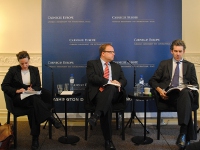Registration
You will receive an email confirming your registration.
IMGXYZ3123IMGZYXGeorgia is entering a critical period of political transition in 2012 and 2013. The country faces fundamental choices about its strategic direction and long-term development model. Georgia’s Choices: Charting a Future in Uncertain Times, a new report by Carnegie’s Thomas de Waal, reviews the current domestic situation and the choices Georgia must confront. The report assesses the country’s economic model and what closer integration with the European Union would entail. Jacqueline Hale, senior policy analyst with the Open Society Institute–Brussels, discussed the report with de Waal. Carnegie’s Jan Techau moderated.
Georgia’s Possible Future
De Waal highlighted three state models Georgia could follow, each pointing the country in a different direction:
- The European Union Model, with regulated markets and democratic accountability;
- The Old Georgia Model, with an emphasis on patriotism, religion, and family networks ;
- The “Singapore” Model (as it is understood in Georgia), which offers a deregulated economy with a minimal government.
According to de Waal, the most favorable way forward for Georgia is the EU model, as closer integration would mean access to the European market, and would ensure greater economic and political stability.
Georgia and EU Investment
Georgia needs to make a well-defined and strategic choice on how to work with the EU, while Brussels needs to communicate better the value of a European choice, de Waal said. The EU should make clear whether it has invested in Georgia’s public financial processes and whether any conditionality was attached, Hale mentioned. Georgia received a substantial Western aid package in 2008, but needs to now wean itself off of foreign help and develop a stable economy, de Waal said.
State Institutions
- Power of the State: The current governing elite has built what amounts to a one-party state, de Waal said. While Georgia has tackled corruption much more effectively than other ex-Soviet states, it now has powerful and unaccountable law and order agencies, he warned.
- Criminal Justice: De Waal also mentioned that Georgia’s jails are overcrowded and that the existing criminal justice system makes it nearly impossible to be acquitted, suggesting an extremely aggressive judicial system. He urged the establishment of a system of checks and balances, as there is insufficient due process currently.
Reforms
While Georgia has enacted modernizing reforms, more democratization and inclusive politics is necessary to strengthen institutions and tackle poverty and unemployment, de Waal said. If these reforms last beyond the 2013 elections, then Georgia could be seen as a positive example in the region. This could have strategic value for the EU, de Waal explained. Georgia has made strides in bolstering human rights, and has a strong civil society that can hold the government accountable for good governance and transparency, Hale added. However, there is still a lack of connection between the government and its people, Hale stressed. There is also a lack of political debate, and general apathy in the government, Techau concluded.
